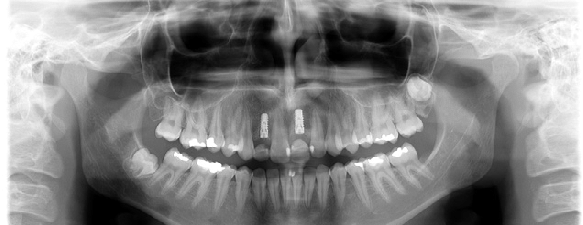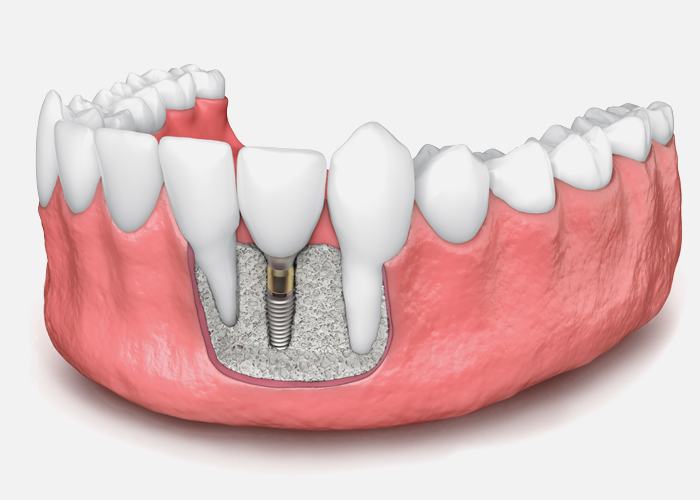Dental Implants
What is dental implants?
An Dental Implants is an artificial tooth root that is placed on the jaw bone and made of suitable material in order to restore the function and aesthetics of the missing one or more ın the raw teeth, larger span of missing teeth, or even dentures.
An implant is an artificial tooth root which is surgically inserted into the jawbone. It is used to hold a prosthetic tooth or series of teeth in place. In this way, dental implants function in a similar way to a natural tooth root.

The process of placing a dental implant involves multiple steps, including:
Implant dentistry, or “implantology”, involves several stages. The work can be carried out by a dentist with the adequate advanced training, a periodontist, or an oral surgeon.
The preparation before the operation, a meticulous examination ought to be carried out. Your teeth and gums will be examined dental x-ray will be needed and any related problems will be treated before the dental implant surgery is carried out. Your dentist will review the nerves, sinuses and bone structure around the area to be treated.

Is it suitable for implant?
All-ceramic or porcelain dental crowns provide better natural color match than any other crown type and may be more suitable for people with metal allergies. All-ceramic crowns can be used for frontal and back teeth.
Patients who have low bone density or a damaged jawbone may first need a bone graft to strengthen the jaw. Having a bone graft delays the tooth implant procedure considerably since it can be anywhere from three months to a year before the bone can support an implant.
In order to be a good candidate for a dental implant, the patient should have strong, healthy gums and a jawbone that is capable of supporting the new root.
Dental implants work as a complete tooth replacement. They are made of three components: the post, abutment, and restoration.
The dental implant post is lıke a tooth screw. It is generally made of titanium and integrates into the jawbone like a tooth root. This is a process known as osseointegration. The abutment is attached to the post, and the restoration, or crown, is attached to the abutment.

Why to use an implant? Who can use teeth implants?
- To stop your tooth from shifting into the empty space: When you lose a tooth, the surrounding tooth will eventually begin to move ın order to fill into the space. This can cause several dental complications. Roughly spaced or densed tooth ıs harder to keep ıt clean and could cost you a fortune in orthodontic care. Placing a dental implant now, will keep your tooth properly spaced and make it easy to keep ıt clean.
- To conserve your jawbone: If you choose the fixed bridge instead of getting a dental implant, your jawbone will eventually begin to declıne underneath the missing tooth. This occurs because you don’t receive adequate stimulation to the bone without a tooth root. The same situation occurs with dentures that are not implant-supported. If you ask yourself and wait to get a long time dental implants, the more tıme likely it is, that your jawbone may lack the integrity to get implants in the future without a dental bone graft.

- An ımplant-supported dentures – Many people have a problem with their dentures. The problems are weak fit, sores in their mouths, sunken lips, and food restrictions. If you wear dentures, you can get a fixed and permanent solution with an implant-supported dentures. There are various procedures for dentures available and some even support a full arch of prosthetic teeth with as few as four implants
- Preserve your appearance – When your jawbone begins to deteriorate because of missing teeth, it often causes your lips to appear sunken in. Unfortunately this situation can make you look years older than you are. This is the reason why people with dentures often complain of having thin lips and sunken cheeks. Dental implant posts provide the stimulation your body needs to produce dense, healthy jawbone material and keep your face looking full and youthful.
Dental implants may be right for you, if you:
- Have one or more missing teeth.
- Have a jawbone that’s reached full growth.
- Have adequate bone to secure the implants or are able to have a bone graft.
- Have healthy oral tissues.
- Don’t have health conditions that will affect bone healing.
- Are unable or unwilling to wear dentures.
- Want to improve your speech.
- Are willing to commit several months to the process.


